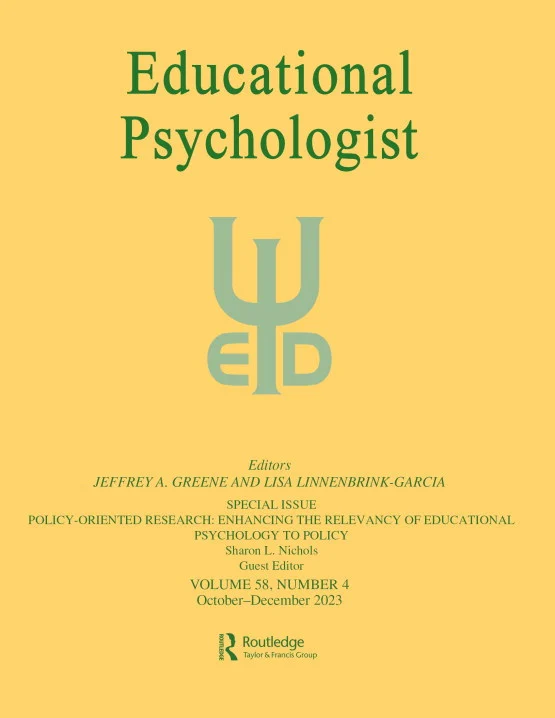Motivational climate theory: Disentangling definitions and roles of classroom motivational support, climate, and microclimates
IF 11.4
1区 心理学
Q1 EDUCATION & EDUCATIONAL RESEARCH
引用次数: 8
Abstract
Abstract The study of classroom processes that shape students’ motivational beliefs, although fruitful, has suffered from a lack of conceptual clarity in terminology, definitions, distinctions, and roles of these important processes. Synthesizing extant research and major theoretical perspectives on achievement motivation, I propose Motivational Climate Theory as a guide for future research efforts toward more accurate, systematic understanding of classroom motivational processes. As an initial organizing framework, three broad categories of classroom motivational processes are defined: motivational supports, consisting of speech, actions, and structures in a setting that are controllable by the people in that setting; motivational climate, defined as students’ shared perceptions of the motivational qualities of their classroom; and motivational microclimates, or students’ individual perceptions that differ from shared perceptions. Motivational support and climate’s key characteristics and mechanisms are described, followed by recommendations, future directions, and implications for research, practice, and policy.动机气候理论:厘清课堂动机支持、气候和微气候的定义和作用
对塑造学生动机信念的课堂过程的研究虽然卓有成效,但在这些重要过程的术语、定义、区别和作用方面缺乏概念清晰度。综合现有研究和成就动机的主要理论观点,我提出动机气候理论作为未来研究工作的指导,以更准确、系统地理解课堂动机过程。作为最初的组织框架,课堂动机过程被定义为三大类:动机支持,包括在该环境中由人控制的言语、行动和结构;激励氛围,定义为学生对课堂激励品质的共同认知;以及动机微气候,即学生的个人认知与共同认知不同。本文描述了动机支持和气候的主要特征和机制,随后提出了建议、未来方向以及对研究、实践和政策的影响。
本文章由计算机程序翻译,如有差异,请以英文原文为准。
求助全文
约1分钟内获得全文
求助全文
来源期刊

Educational Psychologist
Multiple-
CiteScore
19.10
自引率
3.40%
发文量
16
期刊介绍:
The Educational Psychologist is a scholarly journal dedicated to exploring the psychology of learning and instruction. Articles in this journal encompass a diverse range of perspectives, from examining psychological mechanisms to exploring social and societal phenomena related to learning and instruction. The journal publishes theoretical and conceptual articles, as well as reviews and meta-analyses, that significantly contribute to theory or advance the methods used to explore educational psychology. Emphasizing innovation and advancing understanding, the journal does not publish articles solely reporting the methods and results of empirical studies; instead, all submissions, including reviews and meta-analyses, must offer clear implications for advancing theory. In addition to regular articles, the journal features special issues that delve into important themes in educational psychology, along with focal articles accompanied by peer commentary.
 求助内容:
求助内容: 应助结果提醒方式:
应助结果提醒方式:


